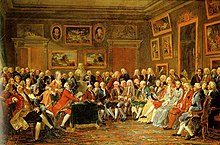Salon (France)
The salons of early modern France were social and intellectual gatherings that played an integral role in the cultural development of the country.
The salons were seen by contemporary writers as a cultural hub for the upper middle class and aristocracy, responsible for the dissemination of good manners and sociability.
Salons became a center of intellectual conversation, as well as a debate stage for social issues, playing host to many members of the Republic of Letters.
[4] Anyone of any social class could frequent the coffeehouses, and so they became associated with equality and republicanism; however, in many cities and countries, women were excluded because at this point in time they were widely considered the “weaker” sex, incapable of debating or learning in a male-dominated area.
[5] These coffeehouses can be seen as a predecessor to the Salons of the French Revolution in that they provided non-aristocracy with access to knowledge and were a hub for discussion on Enlightenment ideals, political reform, and the arts.
For decades Court Life was how upper class French men and women communicated, spread new ideas, and created cultural trends.
[10] The disagreements that surround the content of discussion partly explain why the salon's relationship with the public sphere is so heavily contested.
[citation needed] This criticism stems largely from Norbert Elias’ The History of Manners, Book 1 of The Civilizing Process 1939, in which Elias contends that the dominant concepts of the salons – politesse, civilité and honnête – were ‘used almost as synonyms, by which the courtly people wished to designate, in a broad or narrow sense, the quality of their own behaviour’.
[20] Antoine Lilti ascribes to a similar viewpoint, describing the salons as simply ‘institutions within Parisian high society’.
[4] Philosophes, who were integral to the Enlightenment becoming as widespread as it did, relied on Salonnières to give them an audience with people who held political influence to share their ideas.
[28] salonnières also played governess roles during political debate between philosophes and more traditional thinkers, often keeping conversation from erupting into argument when there were disagreements.
[29] The integral role that women played within salons, as salonnières, began to receive greater - and more serious - study in latter parts of the twentieth century, with the emergence of a distinctly feminist historiography.
[34] While few historians doubt that women played an important, significant role in the salons, Goodman is often criticised for her narrow use of sources.
Rolands Salons were an important meeting place for many politicians of the time and her husband, Jean-Marie, became secretary of the interior in 1792, expanding her political influence.
[38] Records say Roland never actively participated in the conversations held during her salons, she instead sat in the corner of the room, doing some other task such as writing or needlework, but listened carefully to the debates happening around her.
Unlike Madame Roland, a fellow member of Girondins, Condorcet was a feminist and openly supported equal political and legal rights for women.
[citation needed] Jean-Jacques Rousseau, an Enlightenment philosopher highly praised among historians for his pieces on government and inequality and known for his proposal of the ‘Social Contract’, was opposed to Salonnières and the involvement of women in political debate.
